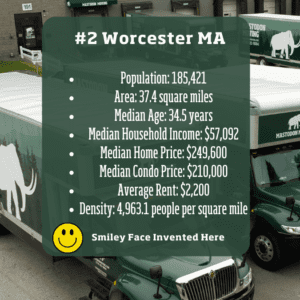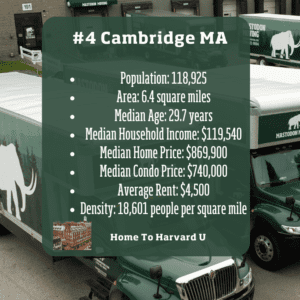Here are the top 10 largest cities in Massachusetts. By learning the specifics about the overall demographics of the state, you’ll gain valuable insights into Massachusetts’ largest cities and how they differ from one another.
Massachusetts State Overview
- Population: 6,892,503
- Median Age: 39.7 years
- Median Household Income: $85,843
- Median Home Listing Price: $418,600
- Area: 7,801 square miles
- Density: 883.5 people per square mile
Largest Cities in Massachusetts
Before relocating to Massachusetts, it’s essential to understand the unique characteristics of its major cities, including population, job markets, cost of living, and quality of life.
1. Boston
Boston is the largest city in Massachusetts and serves as the state’s cultural and economic hub. Known for its rich history, world-class universities, and iconic sports teams, Boston offers an exciting urban environment with access to many recreational and cultural activities.
- Population: 694,295
- Area: 48.3 square miles
- Median Age: 32.6 years
- Median Household Income: $79,018
- Median Home Price: $627,000
- Median Condo Price: $560,000
- Average Rent: $3,400
- Density: 14,363.1 people per square mile
Why Move to Boston?
Boston is a city with a blend of historic charm and modern innovation. It’s home to major employers like General Electric, Boston Children’s Hospital, and MIT. Its diverse neighborhoods, outstanding educational institutions, and vibrant job market make Boston one of the best places to live for young professionals, families, and retirees alike. Thinking of moving to Boston? Find Boston Movers.
2. Worcester
 Located in central Massachusetts, Worcester is known as the “Heart of the Commonwealth.” It combines the benefits of a mid-sized city with affordability and a rich cultural scene. Worcester offers a thriving arts scene, excellent healthcare, and multiple higher education institutions.
Located in central Massachusetts, Worcester is known as the “Heart of the Commonwealth.” It combines the benefits of a mid-sized city with affordability and a rich cultural scene. Worcester offers a thriving arts scene, excellent healthcare, and multiple higher education institutions.
- Population: 185,421
- Area: 37.4 square miles
- Median Age: 34.5 years
- Median Household Income: $57,092
- Median Home Price: $249,600
- Median Condo Price: $210,000
- Average Rent: $2,200
- Density: 4,963.1 people per square mile
Why Move to Worcester?
Worcester offers affordability, diverse job opportunities, and a strong healthcare sector. UMass Memorial Health and Hanover Insurance are among the top employers. With its growing downtown and proximity to Boston, Worcester is ideal for those seeking a balanced lifestyle. Learn more about cities in Worcester County.
3. Springfield
Springfield, often referred to as the “City of Firsts,” is known for its deep historical roots and innovation. The city is a regional center for education and healthcare, and it offers residents a suburban feel with access to urban amenities.
- Population: 153,599
- Area: 31.9 square miles
- Median Age: 32.1 years
- Median Household Income: $44,596
- Median Home Price: $165,800
- Median Condo Price: $135,000
- Average Rent: $1,500
- Density: 4,819.7 people per square mile
Why Move to Springfield?
Springfield is affordable with a rich cultural history, including the Basketball Hall of Fame and the Springfield Museums. Its location near the Connecticut River and a reasonable cost of living make it an attractive place for young families and professionals.
4. Cambridge
 Cambridge is one of the most affluent cities in Massachusetts, famous for being home to Harvard University and MIT. It’s a dynamic city with a strong innovation economy, excellent public transportation, and a lively cultural scene.
Cambridge is one of the most affluent cities in Massachusetts, famous for being home to Harvard University and MIT. It’s a dynamic city with a strong innovation economy, excellent public transportation, and a lively cultural scene.
- Population: 118,925
- Area: 6.4 square miles
- Median Age: 29.7 years
- Median Household Income: $119,540
- Median Home Price: $869,900
- Median Condo Price: $740,000
- Average Rent: $4,500
- Density: 18,601 people per square mile
Why Move to Cambridge?
Cambridge is perfect for those who want to live in a tech-driven city with close proximity to Boston. It’s also a great place for academic and cultural enthusiasts, thanks to its prestigious universities and numerous museums, parks, and restaurants. Learn more about cities in Middlesex County MA.
5. Lowell
Lowell, known as the cradle of the American Industrial Revolution, has transformed into a thriving city with a mix of historic and modern elements. It’s one of the best places to find a balance between work and family life.
- Population: 110,990
- Area: 13.6 square miles
- Median Age: 36.2 years
- Median Household Income: $62,487
- Median Home Price: $293,900
- Median Condo Price: $250,000
- Average Rent: $2,000
- Density: 8,156.8 people per square mile
Why Move to Lowell?
Lowell offers a lower cost of living with plenty of job opportunities in education, healthcare, and manufacturing. Its proximity to Boston and vibrant arts scene make it an excellent option for families and young professionals.
6. Brockton
Brockton, known as the “City of Champions,” has a rich sports history and a strong community feel. It’s a suburban city located just south of Boston, making it ideal for commuters looking for affordable housing options.
- Population: 95,705
- Area: 21.3 square miles
- Median Age: 36.1 years
- Median Household Income: $60,250
- Median Home Price: $314,600
- Median Condo Price: $270,000
- Average Rent: $2,300
- Density: 4,486.3 people per square mile
Why Move to Brockton?
Brockton’s convenient location near Boston, combined with its affordable housing and tight-knit community, makes it a desirable destination for families and working professionals.
7. New Bedford
New Bedford is famous for its strong maritime history and is home to the top-ranked fishing port in the U.S. The city provides a coastal lifestyle with a robust local economy centered around its fishing industry.
- Population: 95,348
- Area: 20 square miles
- Median Age: 35.8 years
- Median Household Income: $47,305
- Median Home Price: $243,300
- Median Condo Price: $210,000
- Average Rent: $1,900
- Density: 4,767.4 people per square mile
Why Move to New Bedford?
New Bedford’s unique combination of history, art, and its location on the coast make it a charming place to live. It’s also ideal for those looking for more affordable housing near the water.
8. Quincy
Quincy is known as the “City of Presidents” and is located just south of Boston. With its mix of urban and suburban environments, Quincy offers access to great schools, parks, and a short commute to downtown Boston.
- Population: 94,468
- Area: 16.6 square miles
- Median Age: 40.2 years
- Median Household Income: $80,959
- Median Home Price: $475,700
- Median Condo Price: $420,000
- Average Rent: $3,200
- Density: 5,700.2 people per square mile
Why Move to Quincy?
Quincy offers a suburban atmosphere with easy access to Boston’s job market, beautiful parks, and a growing dining scene. Its scenic views and proximity to the water make it a great place for families. Thinking of moving to Quincy? Learn more about South Shore Movers.
9. Lynn
Lynn is a coastal city located northeast of Boston, known for its rich industrial history and scenic waterfront. It has a diverse population and a strong sense of community.
- Population: 94,300
- Area: 10.7 square miles
- Median Age: 35.7 years
- Median Household Income: $61,572
- Median Home Price: $380,600
- Median Condo Price: $340,000
- Average Rent: $2,500
- Density: 8,777.4 people per square mile
Why Move to Lynn?
Lynn’s coastal location and relatively affordable housing make it attractive for those seeking to live near Boston without the high cost. It also offers a growing arts scene and numerous outdoor activities.
10. Fall River
Fall River is known for its Portuguese heritage and maritime history. Located near the Rhode Island border, it offers a blend of suburban and urban lifestyles with access to coastal recreation.
- Population: 89,534
- Area: 33.1 square miles
- Median Age: 39.2 years
- Median Household Income: $41,346
- Median Home Price: $259,600
- Median Condo Price: $225,000
- Average Rent: $1,800
- Density: 2,705.1 people per square mile
Why Move to Fall River?
Fall River is ideal for those looking for affordable living near the coast. It’s a diverse city with a strong community feel, rich history, and scenic views of the Taunton River.
